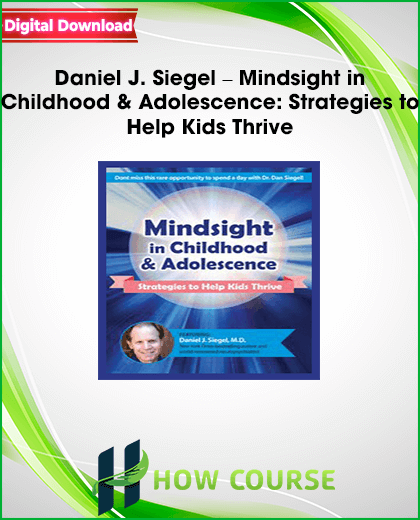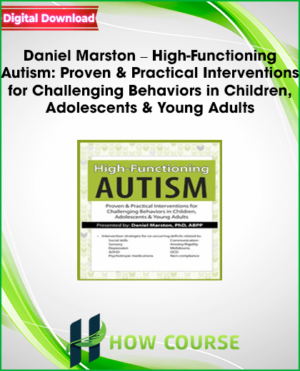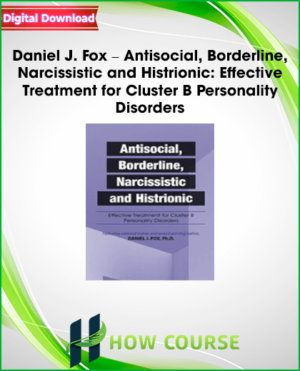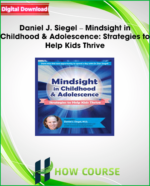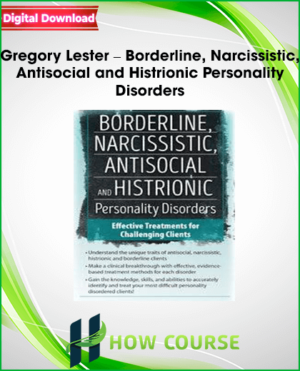Daniel J. Siegel – Mindsight in Childhood & Adolescence: Strategies to Help Kids Thrive
Faculty:
Daniel J. Siegel
Duration:
6 Hours 11 Minutes
Format:
Audio and Video
Copyright:
May 22, 2019
Description
Are you struggling to effectively treat children and adolescents who may be experiencing behavior disorders, trauma, anxiety, and mood disorders?
Daniel J. Siegel, M.D, New York Times bestselling author and worldrenowned neuropsychiatrist, has developed the Mindsight approach, which provides a unique understanding of relationships, brain, and the developing mind. Built on decades of synthesis of a range of fields of research to help create the field of Interpersonal Neurobiology, his approach expertly illuminates the science of how the young mind is formed, and provides relational strategies that support brain integration to support healthy development and achieve optimal regulation and lasting change in the child’s or adolescent’s life.
Childhood and adolescence are important and distinct periods of brain development. When we understand the similarities and differences across these periods, we can better support the development of children and adolescents. You will take home practical skills for teaching youth how to use the mind to create integration within the body and brain, and within our relationships with people and nature.
Equipped with this knowledge and these skills, clinicians, educators, and parents are in a strong position to use science-inspired strategies to support the growth of well-being lives of children and adolescents to help them thrive!
If you work with children & adolescents, this is a course you do not want to miss!
Course Content Disclosure:
Course content will focus exclusively on the Mindsight Approach.
Handouts
Manual – Mindsight in Childhood & Adolescence (2.8 MB)
51 Pages
Available after Purchase
Instructions for ASHA Credit – SELF STUDY ONLY – 05/22/19 (38.5 KB)
Available after Purchase
Outline
Mind, the Embodied Brain and Relationships: An Understanding for Clinical Application
The influences the mind, brain and relationships have on one another
Overlaps and distinctions among these three aspects of human life
Impact on the development of well-being and resilience
Use the Mindsight lens for clinical assessment and intervention
The Developing Mind in Childhood and Adolescence: Strategies to Nurture and Heal the Developing Mind
Neuroplasticity: The ways the brain changes in response to experience
The power of neuroplasticity to transform lives
The 9 Domains of Integration
Strategic neuroplastic interventions
Key elements that promote neuroplasticity
The fundamental principles of Interpersonal Neurobiology (IPNB)
Integrating IPNB into your current treatment techniques
Harness the role of relationships in shaping the developing brain
Clinical research implications and treatment limitations
Attachment, Resilience, and Childhood Development: Clinical Assessment and Treatment for Children
The science underlying the categories of attachment
How attachment experiences shape development
Understand attachment for better clinical assessment and treatment planning
Examine the role of relationships in cultivating a strong mind
Techniques for neural integration and self-regulation
Strategies for children in a clinical setting, at school and at home
Working with the Remodeling of the Adolescent Brain: Brain Remodeling During a Time of Change
The essence of adolescent development
Benefits and challenges of this important period of life
Risk-taking, pushing-away, and sexual behavior of adolescence
The myths vs. modern scientific views of adolescence
Practical steps to building a more integrated adolescent brain
Clinical strategies for staying present through the changes and challenges
Mindsight skill practices to use with teens
Faculty
Daniel J. Siegel, M.D. Related seminars and products: 48
Neuropsychiatrist
Mindsight Institute
Dr. Siegel is a clinical professor of psychiatry at the UCLA School of Medicine and the founding co-director of the Mindful Awareness Research Center at UCLA. He is also the Executive Director of the Mindsight Institute which focuses on the development of mindsight, which teaches insight, empathy, and integration in individuals, families and communities.
Dr. Siegel received his medical degree from Harvard University and completed his postgraduate medical education at UCLA. He served as a National Institute of Mental Health Research Fellow at UCLA. Dr. Siegel serves as the founding editor for the Norton Professional Series on Interpersonal Neurobiology which contains over seventy textbooks. He has also authored several books, five of which are New York Times bestsellers: Aware: The Science and Practice of Presence, Mind: A Journey to the Heart of Being Human, Brainstorm: The Power and Purpose of the Teenage Brain, and two with Tina Payne Bryson, Ph.D: The Whole-Brain Child and No-Drama Discipline.
Dr. Siegel’s ability to make complicated concepts exciting as well as easy to understand has led him to be invited to address local, national and international organizations where he speaks to groups of educators, parents, public administrators, healthcare providers, policy-makers, clergy and neuroscientists. He has been invited to lecture for the King of Thailand, Pope John Paul II, His Holiness the Dalai Lama, Google University, and TEDx. For more information about his educational programs and resources, please visit: www.DrDanSiegel.com
Speaker Disclosures:
Financial: Dr. Daniel J. Siegel is the executive director of the Mindsight Institute. He is an author for W.W. Norton publishing and receives royalties. He is an author for Bantam publishing and receives royalties. He is an author for Guilford Press and receives royalties. He is an author for Tarcher/Penguin and receives royalties. He is an author for Random House and receives royalties. He receives a speaking honorarium from PESI, Inc.
Non-financial: Dr. Daniel J Siegel is a clinical professor at UCLA School of Medicine. He does not receive compensation.
> Please contact our team if you have questions, or broken links via our email [email protected].

